My sister and her husband recently visited our homestead, and upon being “greeted” by our male guinea, my brother-in-law exclaimed good-naturedly, “Oh look, it’s a space chicken!” And really, that’s pretty much how it feels to meet a guinea for the first time.
Though the guinea fowl has been on farms and homesteads for centuries, it’s never seemed to make it into the popular farm imagery. You’ll be hard pressed to find a toy guinea fowl joining the ranks next to the play-school horses and cows.
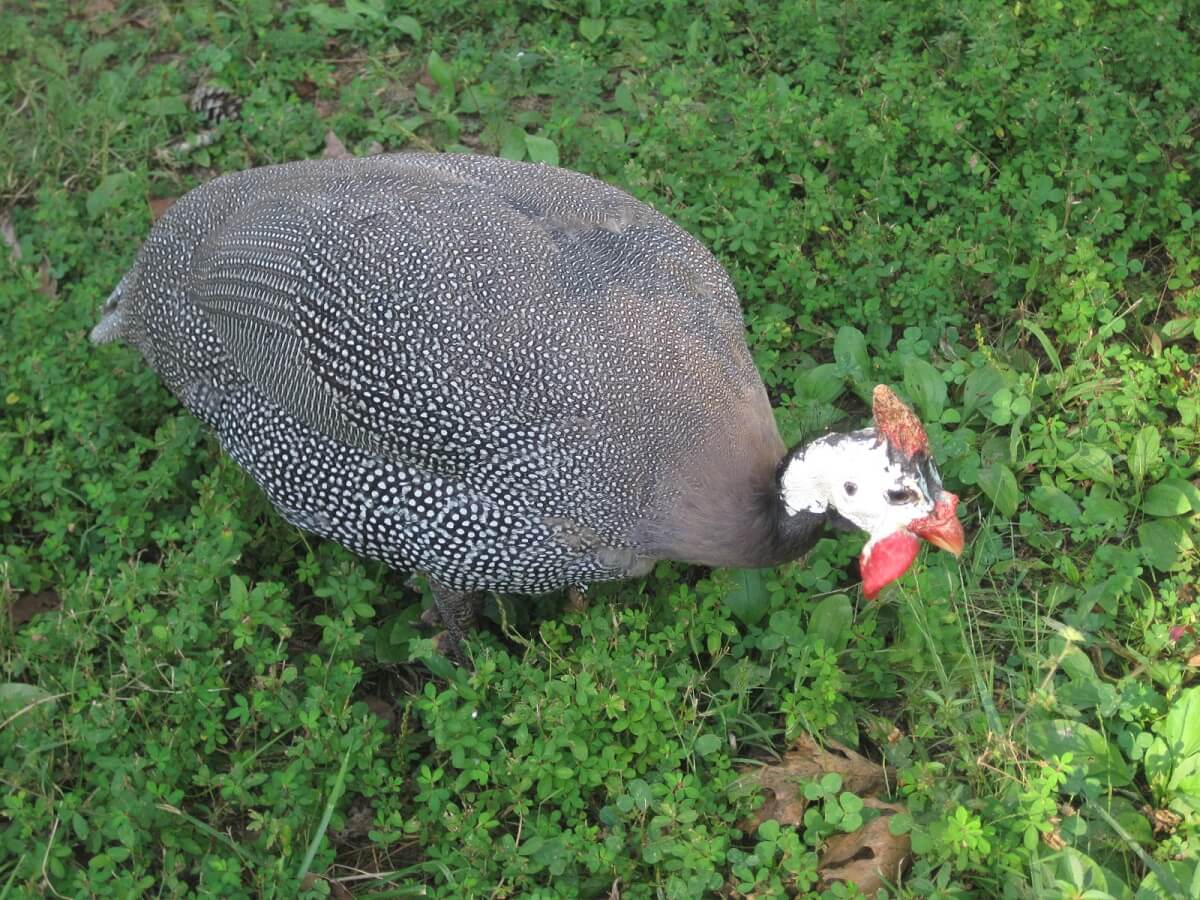
Though I can’t figure out why this endearingly ugly bird has been denied a seat at the popular kids’ table, I still think they are an important part of rural life, and fascinating too! So, if you have recently discovered the barnyard’s best-kept secret and want to add some spice to your poultry population, here’s what you need to know about keeping, raising, and enjoying guinea fowl.
What Is A Guinea Fowl?
Guinea fowls are the loudest, weirdest-looking, and most bizarre-acting creature in any rural plot. Though they are not closely related to chickens, they look like what an alien’s drawing of a chicken might be if they only caught a glance of one from their spaceship. These birds are rather boat-shaped, with subtle tails and wide wings. They have strong running legs and feet.
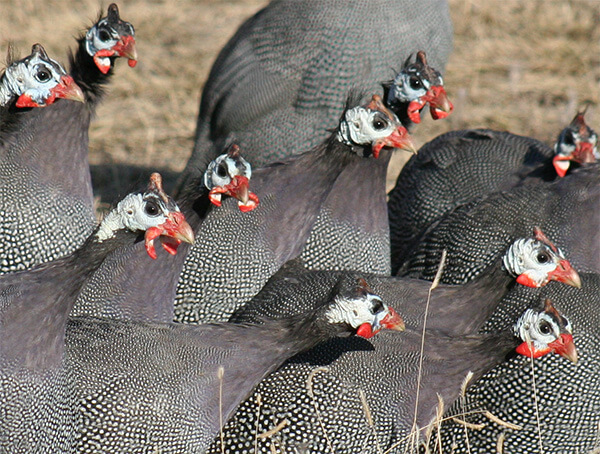
Their somewhat scrawny, iridescent necks rise from their shoulders and end in an unexpectedly bald, white-skinned head, crowned with a horn-like nub that can be nearly dinosaur-like on the males.
Guineas’ powerful-looking beaks are wreathed by some of the most awkward, cup-shaped wattles you can imagine—I still don’t understand how they manage to drink water. They come in quite a few color variations, but the most common forms you’ll see in the U.S. are probably the Pearl form—the white-spotted, dark-grey birds that most resemble their wild counterparts.
Domestic Guinea fowl are derived from the Helmeted Guinea fowl native to several arid regions around Africa. The history of their introduction into rural life is a little foggy, but there are some references to them being kept in Greece as early as the 5th century. Introduced to Europe in the 15th century, they have been part of homesteads and farms in the United States ever since the early settlers brought their livestock with them.
Caring For Guinea Fowl
Guineas are a domesticated fowl…though barely, it seems. They are fantastic at taking care of themselves—indeed, one of the big selling points for guineas is their self-sufficiency.
https://www.instagram.com/p/Bn165SUlHaM/?tagged=guineafowl
Though they can eat the same feed as chickens, they are some of the best foragers on the farm, so feeding them is hardly necessary!
What Do Guinea Fowl Eat?
Guinea fowl are known for being such devourers of ticks, that they can essentially make them a non-issue on your property. Whatever insect, caterpillar, grub, weed, or seed they can catch, they will eat with relish.
The only thing that I provide for my guinea fowl are pans of fresh water, near the house—I hope it encourages them to stay close. I also offer occasional handfuls of birdseed, mostly to motivate them to go places that I want them to go.
Naturalizing Guinea Fowl
Though some people with enough property allow guineas to “naturalize” on their property, this comes with collateral risk. If you release your guineas and let them just do their thing on your land, expect to lose up to half of them to predators.
These bold birds will just as soon rush a predator as run away from it, so many of them are not long for the world if left unprotected. Guineas also roam far and wide for food, so your neighbors will most certainly make their acquaintance if you take a hands-off approach.
https://www.instagram.com/p/Bn1reWXAYlv/?tagged=guineafowl
On our homestead, we have a two-part chicken coop—the roosting area where the chickens retire at night and an enclosed run where they go during the day. We’ve trained the guinea fowl to come back to the run part of the coop at night—it keeps the chickens separate from our rather belligerent male guinea, but also ensures that we’ll wake to the usual sounds of a guinea greeting the sun, rather than a pile of spotted feathers!
Training Guinea Fowl
Some people house their guineas with their chickens directly, others have a separate house for the guineas to roost. In either case, an important ritual to establish is to train the guineas to come back to their house in the evenings.
I use food to motivate mine to go where I want, though long bamboo poles can also be used like a shepherd’s crook. Check out this link for an in-depth method for training and herding your guineas!
Guinea Fowl Can (And Can’t) Be Good Mothers
Guinea hens are hit-and-miss when it comes to being good mothers. They raise huge, communal clutches, probably for this reason—you should anticipate losing quite a few baby guineas (keets, to use the technical term). Until they are two-weeks old, keets are quite fragile—more so than chicken chicks.
https://www.instagram.com/p/Bnzps2RBiI9/?tagged=keets
Keets can get crushed by bigger birds if raised in a mixed-species brooding box. Another danger to a keet is moisture. Guinea hens sometimes kill their newborn keets by leading them through morning dew—they get damp, chilled, and die!
Once guineas reach adulthood, they are tough, hardy birds. You will probably have few, if any, health problems to face with them. This is a good thing because catching a guinea to doctor it is a near-impossible feat without a big net.
Benefits Of Having A Homestead Guinea Fowl
Even before we had moved to our homestead, we’d been told about the tick-decimating skills of roaming guineas. I imagine this is one of the main reasons modern and historical homesteads kept free-range flocks of these weird birds. But their pesticide-free pest management skills don’t end there! Guineas hate snakes and will either alert you to their presence or kill and eat them themselves.
Guineas are also known for being fantastic burglar alarms. It’s hard to describe the ear-splitting cry of an agitated guinea in words: You’ll have to hear it for yourself. The video below doesn’t accurately portray just how loud a male guinea is, though!
Once they know who their people are, they’ll often reserve that call for when the sun rises, sets, and when something unusual has appeared in their territory. The loudness of a guinea flock makes them the cilantro of the bird world—some people don’t mind it, others can’t stand the racket.
These birds are good at cleaning up garden beds, too. Unlike chickens, who I’ve watched completely strip the ground, guineas don’t uproot plants when they eat. They’re much more likely to madly pluck weed leaves, eat bugs and slugs, and leave the ground largely undisturbed. And, of course, their nutrient-rich manure is fabulous for enriching the soil.
https://www.instagram.com/p/Bnwu5w3FH0o/?tagged=guineafowl
Guinea meat is considered a delicacy in France and Italy. I’ve not tried it yet—I’m still relying on my live guinea fowl to eat ticks—but it is said to taste like very flavorful chicken. Low in fat and mostly dark meat, this is sure to be a tasty treat if you find yourself with a surplus of birds. Once butchered and cleaned, they dress out around 2-3 pounds.
The eggs are also delicious, if somewhat small. Guinea hens lay a communal nest that may contain more than 30 eggs at one time…if you can find the nest, that is! They’re excellent at hiding their clutch, so keep an eye on your hens, especially if they cluster in a certain spot or act aggressively around an unexpected area. There very well may be a nest there.
Common Misconceptions About Guinea Fowl
Perhaps one of the biggest misconceptions one may make about guinea fowl is that they are like chickens. They’re not! Chickens amble along—guineas sprint everywhere they go with surprising speed. Chickens cluck and mutter to each other—guineas screech announcements every time they find food, every time they see something unknown, and sometimes even when the wind blows.
https://www.instagram.com/p/BnuecXLFHuI/?tagged=guineafowl
Lots of chicken breeds aren’t the best flyers, but guineas can easily relocate themselves to the boughs of trees and rooftops, where they will continue making loud announcements. Chickens scratch at the ground for their food—though they may scratch once, guineas are more likely to run down grasshoppers, clean up fallen fruit, or browse the tops of plants.
Some chickens can be quite personable—willing to be handled and picked up. I challenge you to even try to catch a guinea—they’re faster than you, and they know it. Guineas can even be downright aggressive.
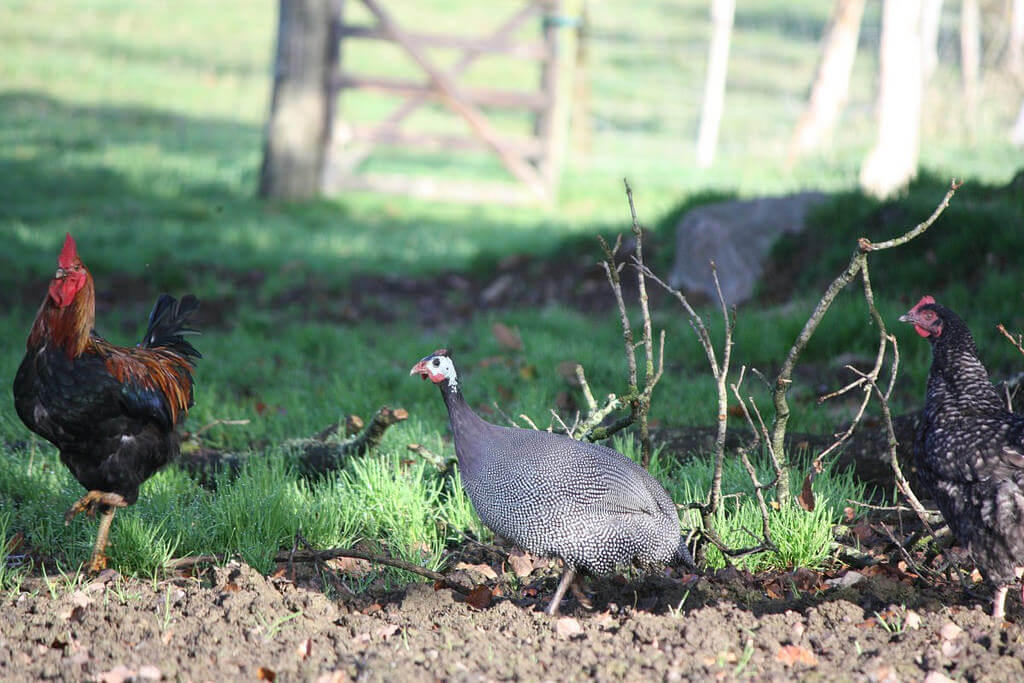
During the breeding season, when my male guinea’s neck turned a beautiful purple, he made a habit of trying to jump and kick at me or my son whenever we brought food to the chickens. My skirt was able to deflect his feet most of the time, but my little boy was knocked off his feet. Females can also be similarly territorial when defending a nest.
My Experience With Guinea Fowl
Guineas have been such a dramatic experience on our homestead. We started out with six guinea chicks, none of whom reached adulthood. They may have been crushed by the chicks we were brooding with them—a lesson that was learned the hard way, for sure.
We tried a second time with adult guineas. When we bought them, we were given the impression that they were survival-minded enough that they would roost high in the trees at night, far from predators. After spending three weeks feeding them in confinement, getting them used to their house and us, we finally released them onto our homestead, visions of tick-free legs dancing in our heads.
We quickly learned the next morning, as we saw trails of white-spotted feathers decorating the fields, that guineas are very good at getting eaten. Maybe my first guineas just weren’t that bright, but after that night, we’ve learned to coop up our remaining guinea fowl at the end of the day.
https://www.instagram.com/p/BntfqOmnD2h/?tagged=guineafowl
We tried a third time with fully feathered young guineas to add to the flock, still small in size, but looking less cute and more like adults. Even though they spent their first night in a fully enclosed, reinforced coop that had areas to roost, we woke up the next morning to find that a raccoon had somehow pulled them through the chicken wire and devoured the poor things.
As a result, I have a love/hate relationship with my guinea fowl, and although our relationship status seems to be firmly set at, “It’s complicated,” I couldn’t imagine my backyard without them. Our guineas have alerted us to the presence of giant rat snakes in the chicken coop, loose dogs, and have eaten more than their share of pests. I hate it when the male jumps on me, but I’ve learned to swish my skirt at the right time, and we’ve reached an understanding of sorts.
And ultimately, I have to admit as well—the sight of a guinea running, full-tilt, while wailing his head off is a particular sort of hilarious situation that can only be truly appreciated in person. Perhaps the unknown perk of these unappreciated birds is the pure amusement they lend to daily life. It’s hard to be serious all the time when a guinea is part of the day!
Resources
- Pros and Cons of Raising Guinea Fowl, Farming My Backyard
- Guinea Fowl: Your Overlooked Backyard Buddy, Modern Farmer
- Guinea Fowl Are Nature’s Pest Control, Backyard Chicken Coops
- Surprising Facts About Guinea Fowl: Know BEFORE Buying!, A Life Of Heritage
- Raising Guinea Fowl: A Low-Maintenance Flock, Mother Earth News
- Five Reasons To Add Guinea Fowl To Your Flock, This NZ Life




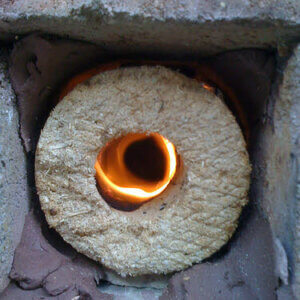

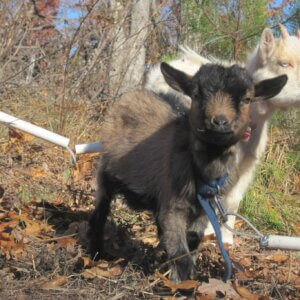




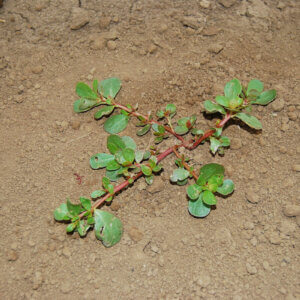













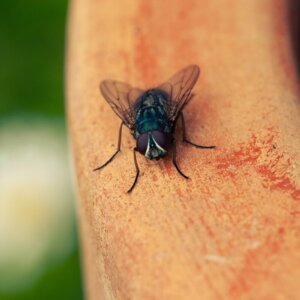
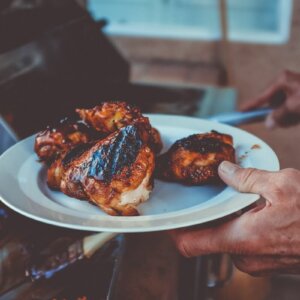






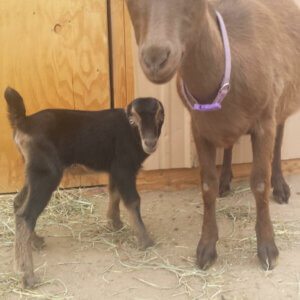





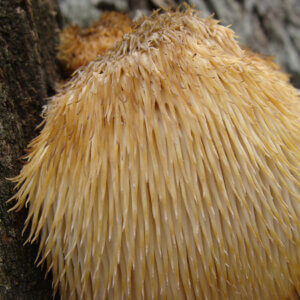


Great article on guineas. We have had alot of the same experiences as you. Love our guineas
Aww, thanks for a nice comment. They’re funny birds, aren’t they? We joked that no matter what we were doing at any point of the day, there had to be a guinea running in the background, yelling at nothing again.
Photo/Attachment:
My wife and I got 6 to start. Dog killed them. Got 8 more for killed all but 1. Got 7 more still have 7 left along with 4 ducks. Our grandkids has a couple hens and 2 Rosters. They all graze together during the day but they roost in tjier mansion at night with the ducks downstairs. Lol
Your experience sounds similar to ours–our guineas, despite our best efforts, seem to be the best at getting eaten! I think it’s because they’re too busy making sounds to make themselves scarce when a predator threatens them, haha. Sounds like you have quite the diverse, fun-to-watch flock. Thanks for your comment!
I have 2 Guinea hens. 1 male 1 female. She has played eggs since March. They are little over a year old.
She stopped or hid eggs for 2 weeks.
They were staying around for 3 days
Then didn’t come home one night.
I searched for 2 days no sound. The second night I heard a chick chick sound in the thick brush. 3 times as I walk away.
That night she came home after dark. No male. I’ve seen a hawk were she made a sound.
He has not come home NO FEATHERS
anywhere. She’s been in coop for 2 nights but she isn’t making a sound.
My question is would a male sit in a hidden nest and not make a sound I’ve crawl through the brush were she was but can’t find him.